- Home
- Julie Smith
Louisiana Lament Page 2
Louisiana Lament Read online
Page 2
The remaining one said, “Is there somewhere we can go to sit down?” and Talba realized that, in some way she’d missed, he’d been ordered to keep an eye on her and Janessa. Getting no answer, he said to Janessa, “Do you work here?”
Janessa nodded. Still not talking.
“Where we can go to talk?”
Janessa thought a moment. “Library,” she said, and led the cop and Talba into a small, comfortable room lined with books and equipped with an antique sofa (the one uncomfortable touch), as well as a couple of wing-back chairs. The two women took the sofa, the cop one of the chairs.
Janessa had evidently been doing some thinking. She answered the question on the table. “I ain’ know what to do. I call Talba ’cause she a detective.”
“PI,” Talba said again. “I work with Eddie Valentino. You know Eddie?” In New Orleans, it was always best to get your bona fides on the table; it made for friendlier treatment. Apparently, this guy hadn’t heard about it.
He ignored her question, instead introducing himself as “Officer Lambert,” and asked for the women’s names and addresses. Lambert was in his thirties, white, and a little pudgy. Talba thought he seemed tired, but perhaps that was just the weight of the job.
The taller and better-looking of the two—the one apparently in charge—was a brother. He returned shaking his head. Talba was pretty sure what that meant.
Janessa said, “Miz Allyson dead?”
Both cops ignored the question. “You say you work for her?”
Janessa nodded.
“What’s her name?”
“Allyson Brower. I’m doin’ some paintin’ for her.”
The black one spoke. He was still standing, wet and dripping, obviously uncomfortable. “Why don’t you tell us what happened here?” He didn’t introduce himself, but his name tag read THOMPSON.
“I ain’ know!” the girl whined, and Talba winced. “All’s I know is, I come in this mornin’ and found her in the pool.”
“How did you get in?”
“With the key in the fake rock outside. Usually Rashad lets me in, but he ain’ here. See, I went out to find him and—”
“Back up a second. Who’s Rashad?”
“He live in the carriage house. Over there—on the other side of the pool.”
“Did you check to see if he’s there?”
“Yes sir. He ain’t. See, I come in, everything real quiet, holler for Rashad, don’t get no answer, you know? Then I go out to find him, find her instead. I start screamin’ and screamin’, bang on Rashad door, even open it, holler for him—he ain’ there. Then I holler for Carmen and Austin, but ain’ nobody answer. I’m gon’ tell ya somethin’, it’s spooky as hell in this big ol’ house. I want to go outside, but it’s rainin’ so hard—and anyway, she outside. So I just try to keep calm, and think who’d know what to do. And I think of my big sister, Talba.”
Thompson said, “Carmen and Austin?”
“Carmen the cleaning lady. Austin Miz Allyson son. He visitin’.”
“And neither one of them’s here?”
Janessa shook her head. “Pretty sure they ain’t. Call Talba.” She shivered. “Spooky in here.”
Talba noticed she’d left out the part about picking up the gun and searching the house.
The doorbell rang, and Thompson strode to answer it. He let in two men pushing a gurney. Coroner’s deputies, Talba thought helplessly. Skip Langdon, where the hell are you?
She tried her theory out on Thompson when he returned. “Was that the coroner’s office?”
As if he hadn’t even heard, Thompson turned to Janessa again. These guys were obviously graduates of the we’ll-ask-the-questions school of police work. She wondered if it would have been different if she’d been Eddie—her thoroughly plugged-in boss—and was sure it would have. By now, he’d no doubt have figured out he knew both these cops’ dads from high school. They’d be afraid he’d call their mothers if they weren’t polite to him.
Thompson said to Janessa, “When did you last see Ms. Brower?”
“Last night. She made supper for Rashad and me. See, I was working late and I heard Rashad and Allyson talking. He all upset about somethin’—yellin’, kind of—so I came out to see what was the matter and she huggin’ him. I look closer and I see he been cryin’. I don’t say nothin’, see, I’m real embarrassed, and I’m about to go back in the bathroom and do some more work when he see me, and he push her away, kind of. Miz Allyson say, ‘It’s okay, Janessa. Rashad’s just had a disappointment, that’s all. I’m ’bout to fix him a snack. Why don’t you join us?’ Just like I’m some invited guest. Rashad say, ‘Sure, Janessa, you been workin’ hard. Come on, have somethin’ to eat.’ So Miz Allyson, she fix us some grilled cheese sandwiches. Rashad, he a poet, ya know?”
She looked sideways at her sister, and suddenly something clicked with Talba. “You mean Rashad Daneene?”
Janessa seemed excited. “You know him? You know Rashad?”
“I’ve met him a few times. At open-mike readings.” And in this house.
“See, my sister’s a poet, too,” Janessa said, and Talba could have sworn there was pride in her voice. “The Baroness Pontalba? You heard o’ her?”
Thompson and Lambert shook their heads, Lambert with a little half smile, as if to say, “Are you kidding? Heard of a poet?” Talba was used to that sort of thing.
Janessa didn’t seem to notice. She said, “There’s this real pristijis writing school—”
Talba struggled with that, then realized the girl had said “prestigious.”
“Hollywood? No, just Holly, maybe. Somethin’ like that.”
“Hollins,” Talba supplied.
“Tha’s it. Well, Rashad didn’t get in. That was the disappointment. See, Miz Allyson, she help writers. She famous for it—tha’s how Rashad come to be livin’ in her carriage house. He take care of things for her—fix things, weed the garden, do a little paintin’. He the one hired me here, to help him paint a couple rooms. He do things for Allyson and she let him live there for free. So she tryin’ to help him get into Hollins and they both real disappointed he didn’t make it. That’s what the whole thing was all about.”
Lambert said, “How did you find out about all that?”
“They told me while Allyson fixin’ supper.”
“And what happened afterwards?”
“Well, I went back to clean up, put things away, and Allyson, she tryin’ to cheer Rashad up. She put on some music, be dancin’ with him. So I come out, all ready to go home, and they say, ‘Come on, dance with us.’ So we all dance a little, we drinkin’ a little wine, and Austin come in.”
“Austin.”
“Allyson son, the one visitin’. Well, he come in and he have a fit. He say, ‘What the hell goin’ on here?’ Something like that, and his mama say, ‘Come on, Austin, let’s dance. It’s a beautiful night to dance.’ And he say again, ‘What the hell goin’ on?’ ’Bout then, we catch on, he really mad, maybe drunk or somethin’. Allyson say, ‘Oh, Austin, it’s so sad. We feel bad for Rashad, ’cause he didn’t get into Hollins. We chasin’ the blues here. Playin’ music, gon’ wake up to a bran’ new day. Come on, get yaself a beer and join us.’
“Well, Austin, he ain’t havin’ none of it. He say, ‘Mama, whatcha doin’ dancin’ with the help?’ Jus’ like that, like he might as wella said the ‘N’ word. Well, Miz Allyson shocked. You can see it. She say, ‘Austin, I didn’t raise you to be rude in front of my friends. You apologize right now.’
“Instead, he say, ‘You gon’ get yaself in trouble this way. Ya don’t know nothin’ ’bout half the people ya hang with. Don’t know whatcha doin’ three-quarters o’ the time. Ya just a ole drunk broke-down whore.’ Well, then that really starts it, they yellin’ back and forth, callin’ each other names, then Miz Allyson say, ‘You ain’t never gon’ get a penny of my money!’ and Austin, he just stalk off. To his room, I guess.”
Lambert and Thompson were clearly riveted.
Talba was more or less on the edge of her chair as well. But Janessa quit talking, seemingly just as her story was getting good.
Thompson crossed his legs, making an obvious effort to control himself. Finally, he said, “Then what happened?” Speaking softly, drawing it out, as if he didn’t much care, just asking to be polite.
“Well, I got real embarrassed and left.”
“Just like that?” Lambert blurted. “Without saying good-bye?”
“No, suh. I say good-bye. Just say, ‘Think I better go,’ somethin’ like that, and Allyson say, ‘Sorry about Austin. He shouldn’t drink.’ ”
“Did you get the feeling he was drunk?”
“Couldn’t tell. Coulda been.”
“Where’d you go when you left?”
“Home.”
“Did you stop anywhere on the way?”
“No, suh. I went straight home.”
“And who do you live with?”
“That ain’t your business.”
Lambert looked thoroughly exasperated. “Let me rephrase the question. Was anyone at home when you got there?”
“Don’t know. Didn’t see nobody.”
The doorbell rang again. It was a couple of male cops in suits—obviously the Homicide guys. Lambert waited with the two women while Thompson filled them in.
Out of the blue, Janessa said, “You sure could use a manicure.” Talba looked at her hands. The last professional manicure she’d had had been the one Janessa did. “Guess I could,” she said. “You could paint my nails ‘Professor Plum.’ ”
Janessa grinned. “You remembered.”
It was their one common memory.
Chapter Two
Talba hadn’t even known Janessa existed until a year and a half before, when she’d found out more or less by accident. The younger woman was her half sister, the daughter of Talba’s father, Denman Wallis, and a woman named Lura Jones, who had died soon after Janessa’s birth. Learning even that much had taken hours of detective work. But Talba needed to find the girl. She owed her big-time—for something she’d taken from her that could never be returned, never be atoned for.
Finally, she traced her to Lura’s sister, Mozelle Winters, who claimed to have raised her, though Mozelle didn’t have a kind word for Janessa, or for Talba’s father, or for Talba. Mozelle had eventually married a well-to-do doctor and Janessa’d left home at fifteen. Talba traced her to a beauty salon called Eve’s Weaves, where she was working as a manicurist, living with the family of her best friend, Coreen Brown. Talba had called on her at the Brown home, talked to a woman who was apparently Coreen’s mother, and learned where Janessa worked. One day she dropped by for a manicure, intending just to get a look at her sister, maybe decide what to do next, but another patron recognized her and sang out her name as she waited her turn.
Mrs. Brown had evidently mentioned her visit. Janessa knew exactly who she was, and, for reasons she hadn’t mentioned, decided to be hostile about it. They talked warily with each other while they literally held hands, Janessa cutting her sister’s cuticles and filing her nails. And then, in an apparent change of heart, Janessa offered to pick a special color for Talba’s polish. It always made Talba smile to think of what Janessa said as she applied it: “It’s called Professor Plum. Whatcha think that means?”
That was almost her only friendly remark. She had not asked Talba a single thing about herself except why the other customer called her “Baroness.”
“It’s my professional name,” Talba had said. “The Baroness de Pontalba.”
And after that, she had to deal with Janessa’s disappointment that she was a mere poet and not a rapper. On impulse, as she left the salon, she’d asked Janessa to come hear her read, but the girl hadn’t shown.
In the weeks that followed, during which her brother’s first daughter was born, making Talba an aunt, she found herself longing to know her sister, and not just because she felt she owed her. It had something to do with a renewed family feeling, maybe; Talba couldn’t really explain it.
She’d dropped by the Brown house again, called repeatedly, even ferreted out Janessa’s e-mail address and tried to reach her through the Internet, all to no avail. And the next time she went to Eve’s Weaves, her sister was gone.
She barely thought about her anymore.
But Janessa, she realized, had thought about her. For one thing, she’d called Talba at work. That meant she’d known Talba was a PI as well as a poet. So she’d been following Talba’s career. But she’d never have called unless she was desperate.
The question was, why was she so frightened?
One of the Homicide guys, Sergeant Reuben Crockett, joined them after what seemed an eternity, during which the crime scene techs had arrived and he had worked with them and the coroners’ deputies. He wasn’t a bad-looking white guy, for someone in his forties, but he had a bossy manner that Talba didn’t much care for. He took Janessa aside to question her, then came back to Talba, isolating her in the living room while her sister waited once again with Lambert. He asked for her story, much as the district cops had, then had a few questions of his own.
“Did you know the victim?”
“I met her once—when I came to a party here.”
“Did your sister kill her?”
That one threw Talba. She didn’t honestly know the answer. She finally said, “She didn’t have a reason to. She was just working here.”
“Oh, really? Ms. um…” he consulted his notes and evidently noted that there were two Ms. Wallises. “…Janessa says Ms. Brower owed her money.”
“That’s a murder motive?”
“You tell me.”
“My impression is that they got along.”
“Does your sister have a history of violence?”
“Not that I know of.”
“Not that you know of. She’s ya sister, right?”
“We’ve been out of touch for a long time. She called me because she needed help.”
Crockett stared at her. “She needed help. Usual thing would be to call the police, wouldn’t it?”
Talba tried to keep cool. “Janessa’s fairly inexperienced. She thought because I’m a PI I could help. I work with Eddie Valentino.” She tried the network ploy again. “You know Eddie?”
Crockett’s face was stony. “Yeah, I know Eddie. Look, Ms.… uh, Talba—why do I get the impression you’re leaving something out?”
How to play this? Talba wondered. Try to stop the bullying or put up with it? Finally, she said only, “I’m not leaving anything out. If you like, you can call my office and find out what time I left.”
“Look to you like that woman died this morning? You’re a PI. She’s been dead for hours—you happen to notice how white she is? Know what we call that?”
“Lividity,” Talba said. “Yeah, I happened to notice—I’m not the one who’s dead here, Sergeant. She died sometime in the night. Is that what you’re saying?”
“You tell me.”
“I’m afraid I’ve told you everything I know. May I take my sister home now?”
“Now, you know better than that.” He walked her back to the library and spoke to both sisters. “You two are going to have to come down and sign a statement. Lambert’ll take ya. You can wait for me at the district.”
“Never mind. I’ve got my car.”
“Okay, Lambert’ll escort ya.”
“You know what? We’re really wet. Can we go home and get changed first?”
He looked them up and down. “You can make one stop. Ya wear each other’s clothes? Ya sisters, right?”
No way, Talba thought. Uh-uh and negative. Janessa is not coming to my house.
But Janessa said, “I got some clothes here I wear to paint in.”
“And I’ve got a pair of sweats in my trunk.”
Crockett held out his hand for her key. “Where’s ya car? Lambert’ll get ya clothes for ya.”
Seeing the melancholy look on Lambert’s face, she thought maybe it wasn’
t such a bad day, after all.
But of course the fun had just begun. She and Janessa were at the station for hours, repeating their stories again and again, then waiting for the statements to be typed up so they could sign them.
When they left, Crockett gave them each a card, after first writing his pager number on it. “Y’all call if ya just happen to remember somethin’, okay?”
Talba had suddenly had it with the meek act. “Are you always this patronizing?” she asked.
To her surprise, he smiled. “Always. You don’t want to mess with me.”
You got that right, she thought.
It was still pouring rain when they left the station. The cops had kept Janessa longer, but Talba had waited. Since Janessa had come on the bus, Talba was happy to take her home, eager to see where she lived, even more eager to conduct her own interrogation. When they were in the car, she said, “You still living with those nice people? The Browns?”
“Kind of. But I got my own apartment now, over the garage. Ain’t no kitchen, but I can use the one in the big house.”
Talba said, “Big changes in your life,” wondering if the girl would take the bait.
To her surprise, Janessa’s face twisted; she bit her lip, but a tear still squeezed out of each of her eyes.
“Not good changes?” Talba said. “You seem good to me.” Provided you didn’t just kill your boss.
“I got things to tell ya.”
Sweet Jesus, I’ll bet you do. She waited.
“Could we get somethin’ to eat? I’m starvin’.”
Talba realized she was, too. Absolutely famished. They drove up Magazine to Café Roma, which was miraculously open, and for once, parking was plentiful, so they didn’t have to run too far in the rain.
“Have whatever you like,” Talba said when they were seated. “I’ll buy. I’m the big sister.” It seemed the decent thing to do, but she had the feeling she was setting an unfortunate precedent. She wasn’t surprised when Janessa didn’t protest.
“What do you have to tell me?”
Janessa looked at her lap. She was silent for so long Talba almost thought she’d changed her mind, but evidently she was just getting up the nerve. “I didn’t call you before because I was embarrassed.”

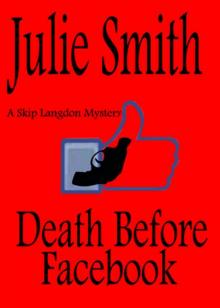 Death Before Facebook (Skip Langdon #4) (Skip Langdon Mystery) (The Skip Langdon Series)
Death Before Facebook (Skip Langdon #4) (Skip Langdon Mystery) (The Skip Langdon Series) P.I. On A Hot Tin Roof
P.I. On A Hot Tin Roof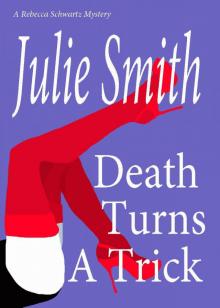 Death Turns A Trick (Rebecca Schwartz #1) (A Rebecca Schwartz Mystery) (The Rebecca Schwartz Series)
Death Turns A Trick (Rebecca Schwartz #1) (A Rebecca Schwartz Mystery) (The Rebecca Schwartz Series) The Axeman's Jazz (Skip Langdon Mystery Series #2) (The Skip Langdon Series)
The Axeman's Jazz (Skip Langdon Mystery Series #2) (The Skip Langdon Series)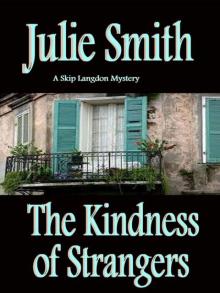 The Kindness of Strangers (Skip Langdon Mystery #6) (The Skip Langdon Series)
The Kindness of Strangers (Skip Langdon Mystery #6) (The Skip Langdon Series) Louisiana Hotshot
Louisiana Hotshot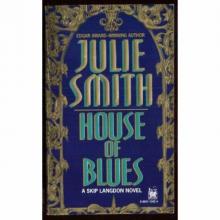 House of Blues
House of Blues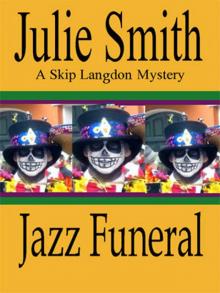 Jazz Funeral (Skip Langdon #3) (Skip Langdon Mystery) (The Skip Langdon Series)
Jazz Funeral (Skip Langdon #3) (Skip Langdon Mystery) (The Skip Langdon Series) Tourist Trap (Rebecca Schwartz #3) (A Rebecca Schwartz Mystery) (The Rebecca Schwartz Series)
Tourist Trap (Rebecca Schwartz #3) (A Rebecca Schwartz Mystery) (The Rebecca Schwartz Series) Louisiana Bigshot
Louisiana Bigshot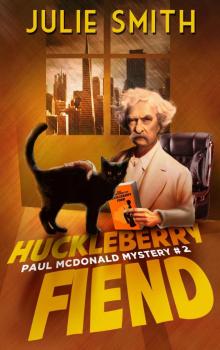 Huckleberry Fiend
Huckleberry Fiend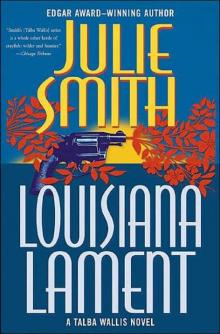 Louisiana Lament
Louisiana Lament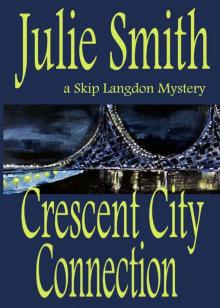 Crescent City Connection (Skip Langdon Mystery #7) (The Skip Langdon Series)
Crescent City Connection (Skip Langdon Mystery #7) (The Skip Langdon Series)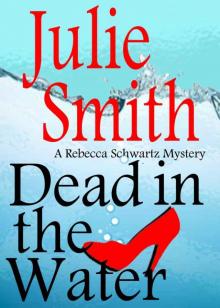 Dead In The Water (Rebecca Schwartz Mystery #4) (The Rebecca Schwartz Series)
Dead In The Water (Rebecca Schwartz Mystery #4) (The Rebecca Schwartz Series)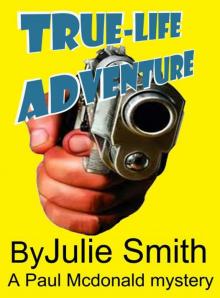 True-Life Adventure
True-Life Adventure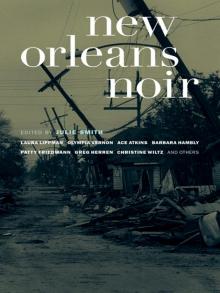 New Orleans Noir
New Orleans Noir